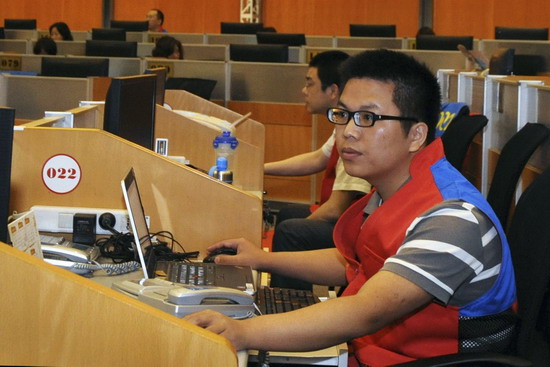Exchange strives to make market more accessible to foreign capital
The Shanghai Futures Exchange aims to launch the nation's first crude futures by the end of the year, said Wang Lihua, chairwoman of the exchange.
The exchange will allow foreign investors to trade the contracts, as part of the nation's move to make its commodity futures market more accessible to foreign capital, Wang told a forum in Shanghai on Monday.
|
 |
|
A trader monitors the silver market at Shanghai Futures Exchange on May 10. The exchange plans to launch the nation's first crude futures by the end of the year.?[Photo / Xinhua]? |
By opening up the market for foreign investors, the SFE aims to become a price-setter for oil in Asia and a global marketplace for crude futures, she added.
China is a heavy user of industrial and agricultural commodities such as oil, copper and aluminum. But with an isolated commodity futures market, the country has little say over global commodity prices.
China accounted for more than half the volume of commodity derivatives traded worldwide in 2010, but few if any global commodity prices are set based on quotes from Chinese exchanges.
The Shanghai Futures Exchange's crude futures "is not just a new futures contract; it marks the opening up and innovation of China's commodities futures market", said Wang.
"We hope to build a market that can attract foreign investors, producers, traders, and consumers. We will launch the contract this year and hope it will become one of the crude oil pricing benchmarks in the Asia-Pacific time zone."
Wang didn't say whether the new contract will be denominated in US dollars or yuan, nor did she reveal the size of the contract.
Crude futures on the New York Mercantile Exchange trade in units of 1,000 US barrels (42,000 gallons) and prices are quoted in dollars and cents per barrel.
Though some foreign banks were given seats on exchanges to trade precious metals, China's commodity futures market is largely off-limits to foreign investors.
The country forbids foreign capital from setting up futures brokerages, and foreign investors have little opportunity to invest in the market, given China's limits on yuan convertibility.
Even the qualified foreign institutional investor program, which allows foreign money managers to invest in mainland capital markets, doesn't cover the commodity futures market.
The SFE is making moves to widen access. Wang said the bourse was working with China's currency regulator on getting quotas for its crude oil investors, which would let participants convert the currency freely within set limits.
Bloomberg reported on Monday that the exchange will probably set up offshore warehouses to let foreign investors trade precious metals and facilitate physical delivery of commodities to Chinese bonded warehouses.
